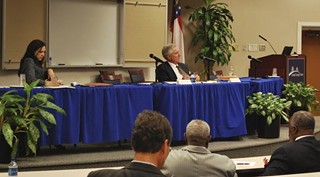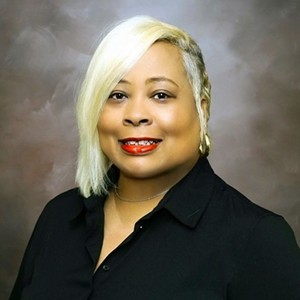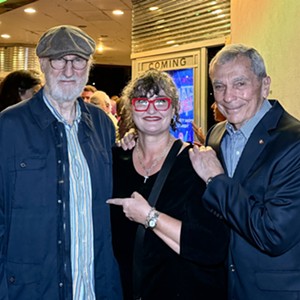A discussion about the state's tax code and economic growth opened several big cans of worms at a meeting of the Tax Reform Council in Savannah, and not all of them were tax related.
The council is a group of business people, economists and tax professionals that was convened by legislators earlier this year to update the state's tax code with the simultaneous goal of making it fairer to taxpayers and more business friendly.
Hundreds of people, from lobbyists to concerned citizens, have been attending the group's initial meetings in Atlanta, which prompted last week's tour of what council chairman A.D. Frazier described as "fact finding missions," including stops in Augusta, Savannah, Valdosta and Macon.
Frazier, a business man perhaps best known for his role in Atlanta's Olympic organization in 1996, was the only member present at the stop in Savannah, which took place at the Coastal Georgia Center last Tuesday afternoon. Another council member, Macon real estate mogul Roy Fickling, was "expected, but must have been delayed," according to Frazier.
Several dozen people were in attendance, including elected officials, industry representatives, tax groups and executives.
Frazier assured the crowd that given the task at hand, the council "won't try to form an opinion until after the election," in November. The council will report their recommendations to a joint committee in January 2011, and the committee will draft legislation that will be subject to an up or down vote by legislators in both houses.
Effingham County resident, Ruth Lee kicked things off by telling Frazier she was disappointed that the council wouldn't be looking more closely at ad valorem property taxes.
She also expressed concerns over alleged malfeasance by the Effingham County Board of Assessors, particularly that property assessments continued to rise, despite the depressed real estate market and that descendents of the Salzburgers who settled the area centuries earlier could be at risk of losing their land.
Lee was followed by Chatham County Commission Chairman Pete Liakakis, who raised questions about the fairness of distribution for franchise fees paid by utility companies.
The fees are collected by companies and paid as "rent" for lines and pipes that cross publicly owned land. Because of state law, the franchise fees are paid to municipalities and consolidated county governments, but can't be paid to Chatham County for use in unincorporated county's Special Service District even though residents of the SSD pay into the franchise fee coffers.
According to Liakakis, $3.2 million was collected in Special Service District by companies like Georgia Power and Atlanta Gas Light, but that money was then paid to the City of Savannah.
"Chatham County has attempted to resolve the unfairness," via the state legislature, Liakakis said. However, because the rule only affects six of the state's 159 counties, it was never addressed.
Having found a sympathetic ear, Liakakis also explained that state mandated services were also a burden to the county budget. He expressed concerns that there were a large number of state prisoners being held in the county jail, the costs for whom was not being fully reimbursed by the state.
According to Liakakis, the state was paying $22 per day for each prisoner, but the cost to the county was closer to $50 per day. Over the last nine years, that discrepancy had accumulated to a sum of $29 million being subsidized by Chatham County taxpayers.
Among other input offered during the meeting, both the American Cancer Society and the Healthy Savannah Initiative support a minimum $1 per pack increase in the excise tax on tobacco products, which would generate an additional $400 million in revenue and provide economic incentive for smokers to quit.
Mike Bell, a representative of forest products company Rayonier, advocated for a continuation of the sales tax exemptions for agriculture and manufacturing sectors, as well as a cut in the tax on energy paid by manufacturers.
The next full meeting of the Tax Reform Council will be in November 3 in Atlanta. For more information on the group, or to submit comments, visit their website: fiscalresearch.gsu.edu/taxcouncil





























